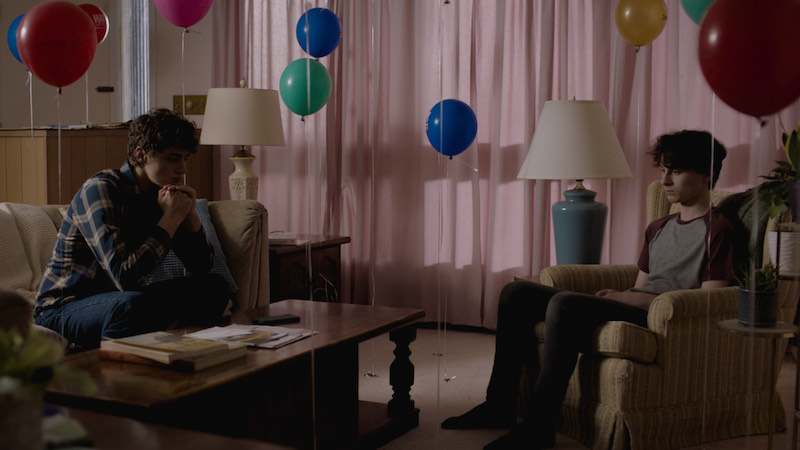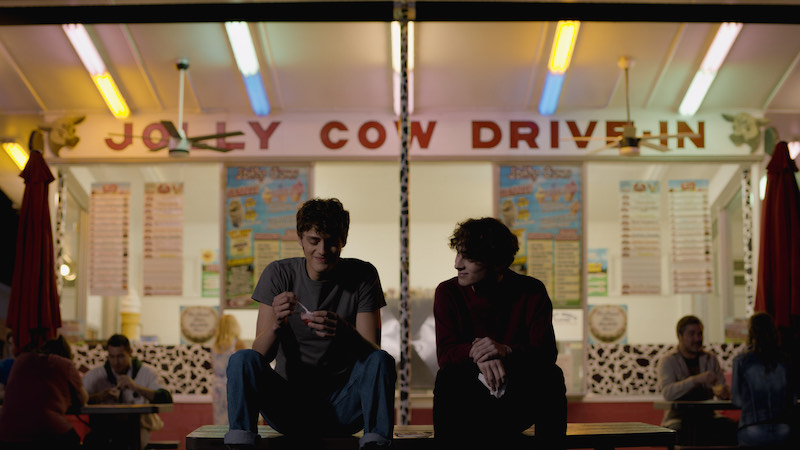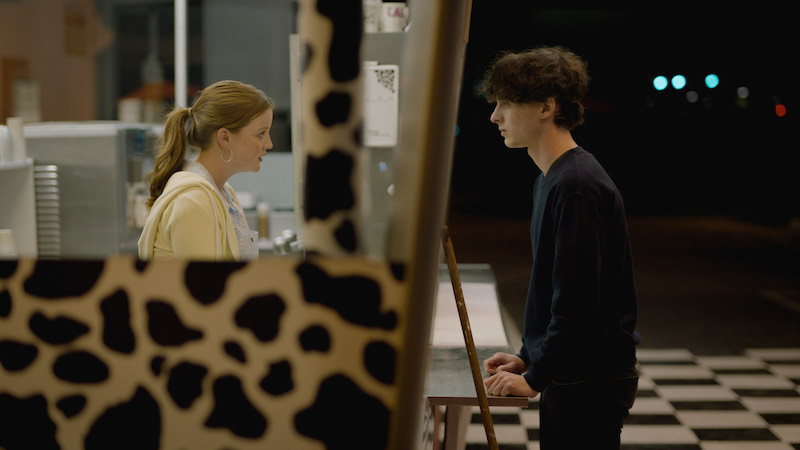by Alice Connolly O’Brien // Feb. 25, 2022
Jamie Sisley’s cinematic repertoire explores onerous topics with ease. Having previously dissected themes like life as a migrant and the tangled nature of America through documentary, his latest film project analyses the tragic cascade of addiction. ‘Stay Awake’ is Sisley’s first feature and was inspired by his own experience growing up. In it, we watch young brothers Ethan and Derek struggle to balance the delicate act of coming of age with the mature responsibility of caring for their mother. The film premiered at this year’s Berlinale and was the recipient of the Crystal Bear – Special Mention of Youth Jury Generation 14plus and Winner of Cinema Vision 14plus Award 2022. We sat down with Sisley to discuss the development of ‘Stay Awake,’ his inspiration for the film and his loyalty to documenting truthful human experience.

Jamie Sisley: ‘Stay Awake,’ 2022, film still // Courtesy of Jamie Sisley
Alice Connolly O’Brien: Your last project ‘Farewell Ferris Wheel’ showcased the struggles of Mexican migrant workers living in the U.S. Although ‘Stay Awake’ is a feature film, it also tells a very personal and human story. What is it about these stories that inspire you?
Jamie Sisley: I’ve always been drawn to human stories. For me, exploring tough subjects through film and via incredible characters feels so humbling. I look at stories as these beautiful pulpits from which I’m able to examine experiences, characters and actually say something.
Sometimes I start to develop a story for a certain reason and months later, I realize that I was drawn to this particular story for a whole other reason, a hidden one. In that sense, creating films is how I allow my hidden feelings to come to the surface and, honestly, doing so is my greatest pleasure.
ACO: In 2015, you came to Berlinale and showcased ‘Stay Awake’ as a short film. Now, seven years later, you have debuted it as a feature film. How does it feel to finally release it into the world?
JS: For a very long time, ‘Stay Awake’ was just a beautiful monkey on my back. It was always in my back pocket but now, as you said, it’s out in the world. Getting to see an audience at the premiere, watch their reactions and answer their questions was amazing, but it was also a little strange. It’s incredible to watch something that has been a very private affair—one that lived in my head, on a page and within various editing bays—live in the real world with real people. It feels surreal to actually comprehend that, to accept that I’ve finally closed this chapter, and acknowledge that it’s about time I start thinking about a new one. But, when the dust settles, I know it’s going to feel pretty great.

Jamie Sisley: ‘Stay Awake,’ 2022, film still // Courtesy of Jamie Sisley
ACO: The characters Ethan and Derek in the film, played by Wyatt Oleff and Fin Argus, have a true brotherly connection. Tell me about the process of casting two actors who not only embodied their characters in this way but also shared a powerful connection with each other.
JS: Prior to releasing the film, I would show people the script and everyone said exactly the same thing. They would all say that the script had potential, but that it was dependent on our casting of the boys. Needless to say, this injected a bit of pressure in our processes, that is until we found Wyatt and Fin.
When we met them we knew instantly that they were our guys. They’re just incredibly good, kindhearted and genuine people. I feel very grateful to them for embodying their characters the way that they did. They fully dedicated themselves to making their relationship feel real and put such a beautiful amount of energy into dissecting their characters and understanding each other. ‘Stay Awake’ is a very personal story to me but, despite that, handing these characters over to them never felt like a leap of faith. I always trusted that they would make them their own.
ACO: Though the film showcases the tragic sides to middle class life in the United States, it also acts as a stage for the beautiful ones. Tell me about your relationship with small-town Americana.
JS: Small-town Americana is something that I’ve been familiar with forever. I was born in Texas and one of my earliest memories is going to the Texas State Fair.
I remember the fair being this incredibly massive experience. It’s always remained in my mind. In light of the many issues that America is facing right now, this kind of memory reminds me of what’s great about our culture.
I think that you can love a country and also acknowledge the many struggles that it is currently facing. The two can occur simultaneously and I wanted this film to be proof of that. I wanted it to be an honest portrayal of modern America, one that celebrated its beauty and also its struggles, because that’s what my experience as an American has been like.

Jamie Sisley: ‘Stay Awake,’ 2022, film still // Courtesy of Jamie Sisley
ACO: Throughout the film, we watch Ethan’s romantic relationship break down and also observe subtle hints that he may have feelings for another male character. Why did you choose to add this dimension to the story?
JS: Primarily, I wanted to weave this into the story because conversations about sexuality have been a big part of my own life. Despite sexuality being this incredibly nuanced thing, I always see it documented through film in the same way, as a character’s main issue. I think this centering of sexuality is demonstrative of how society treats sexual identities. We let them define people and dictate their stories. I just don’t agree with that.
I wanted to nod to Ethan’s sexuality in a way that didn’t shine a huge spotlight on it, but normalized it. I intended for it to be open-ended so that it might spark more nuanced conversations about sexuality instead of recycling ones that have been black and white and all-defining.
ACO: The ending of the film is ambiguous. How important was it to have an ambiguous ending and to not have it neatly wrapped up and happy?
JS: ‘Stay Awake’ was inspired by my own family’s journey with addiction. Truthfully, a picture-perfect happy ending has never been our experience of the disease. Creating a film that showed an exclusively positive journey would be disingenuous.
For us, treatment management has been a series of ebbs and flows. That’s been most people’s experience, too. I wanted to tell an honest story of addiction and, in particular, to showcase the patience, love and care that looking after a family member with addiction issues requires. If I had tied the film up neatly with a bow, it wouldn’t portray the actual lived experiences of people like me, people who love people who are struggling, and that was my goal, to give those people a voice.






















